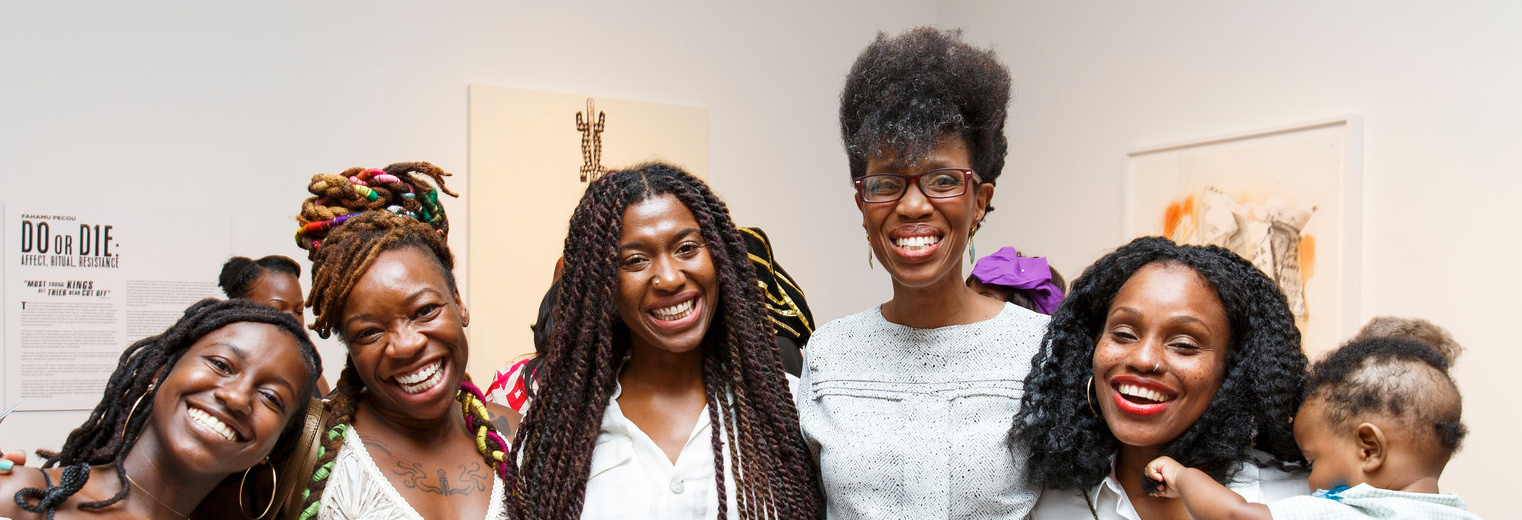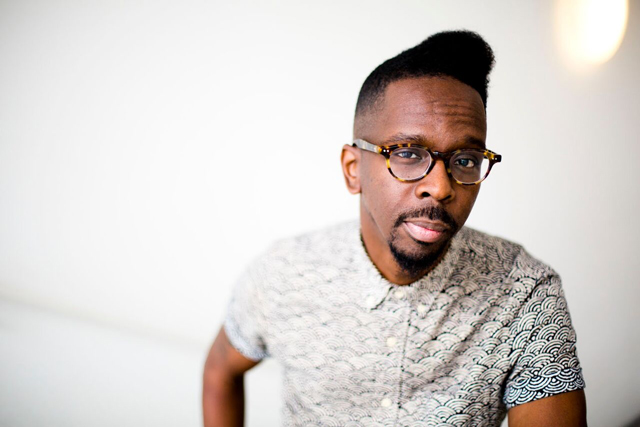


In his body of work DO or DIE: Affect, Ritual, Resistance, Fahamu Pecou uses artwork–painting, drawing, photography, installation, video, and hip-hop music–as a vehicle to directly comment on the delicate and dangerous experiences that black people in modern America face in their day-to-day lives. In a society where judgment, violence, and hatred towards minority citizens systemically exists, it can be tempting to relate such prejudices through the illustration of bloodshed and cruelty. DO or DIE functions in a different way and serves an altogether different purpose, attempting to avoid the fetishization of black death by instead highlighting themes of pride, hopefulness, and transcendence through the reverence of one’s African ancestry and the acknowledgment of the importance of true, historical roots. By incorporating traditional Yoruba/Ifa spirituality into his artwork through both figures and symbols, Fahamu Pecou offers a body of work that primarily serves “not [as] a story of death, but [as] one of life.”
However, the short film titled Emmett Still enhances and ultimately completes the exhibition by serving as the most direct reference to this “spectacle of black death,” both visually and audibly. The title itself explicitly references the brutally violent death of a young Black man from Chicago, Emmett Till, who was ruthlessly beaten and lynched in Money, Mississippi after allegedly flirting with a white woman. His mother insisted on an open-casket funeral, intending to showcase not only the racism and brutality experienced by Black people, but also the discrepancies and limitations within the American democratic system itself. The event served as a major catalyst for the American Civil Rights movement and, as demonstrated by the title of Fahamu Pecou’s short film, continues to resonate within American society as we seek to address issues of racism and inequality.
Opening with the lyrics, “Strange fruit / Raining down in this garden of Eden / Eaten premature it’s the love that we needin’ / Flesh ripped apart it’s like a struggle just bein’ / A troubled skin just to be in / Oh God the struggle we be in,” the song “Strange Fruit” pairs with the initial scenes of the video to present a young, Black man in a typical urban environment. After finishing a game of pick-up basketball with his friends, the man begins walking through a neighborhood–likely walking home–when he unexpectedly encounters a presumptuous police car at a stop sign. The video’s beats and imagery intensify accordingly, with lyrics of “Emmett Still” describing a sense of tension and rigidity in the context of the scene: “The way we move in the world, we constricted / The sense of pride in our hearts, they undid it / The threat of death on our backs, we run with it / The tragedy and the pain we one with it / But politicians try to convince us it’s all unscripted.” The man, exchanging an agitated glance, continues on his way as the officer behind the wheel continues to stare provocatively towards him. Soon the policeman approaches and accosts the young Black man without cause, before unjustifiably shooting him after he attempts to run away in a state of confusion and fear. As a back-drop and compliment to the unjust shooting and the lyrics, excerpts from James Baldwin’s historic speech, “The American Dream and the American Negro” from 1965, permeate the entire scene and draw attention to the fact that for hundreds of years, Black individuals have been subject to prejudice, violence, inequality, and degradation in a country that undoubtedly owes its existence to African-Americans, “the people who built the country.”
Pecou directs the film away from this “spectacle of Black death” when, following his death, the young Black man awakens surrounded by practitioners of the Yoruba/Ifa religion. At the core of this spiritual practice is the respect and reverence of one’s ancestors, the people whose hard work and strong mentality paved the way for African Americans years ago and whose spirits resurface consistently in daily life. Rather than continuing to perpetuate images of Black death, Fahamu Pecou challenges the dominance of death by emphasizing the liminality of life and death and the infinitude of the human spirit. The lyrics of “Flight of the Ancestors” verbalize this cyclical spiritual life: “Different ways to the math / Many paths to the same sum / Salute my ancestors / Until I became one / On the shoulders of giants / I stand in defiance of those that ain’t one with the one / I’m like African drums / Back in the slums / Changing the energy / Engaged with the enemy / Till my frame is a memory / A hum.” Through these exalting lyrics, Pecou clearly establishes the connection between Emmett Still and the rest of DO or DIE, both of which reframe the spectacle of Black death within the aura of spiritual transition and infinitude.
A sense of hopefulness emanates out of the closing scene in conjunction with the cyclical nature of the spirit in the track “GOD,” which presents the newly awakened and initially confused young, Black man following his ethereal experience with the Yoruba/Ifa practitioners. His ultimate realization of his power through his ancestors and his history are demonstrated through the lyrics: “Bold claims / Bent on my destruction / Kanye told you, I’ma show you / You can’t tell me nothing / You can break my body / But can’t claim my spirit / I grow exponential / And I know your fear it / And I know you feel it / In the air you feel it / You can try / But you can’t kill it.” Following “GOD,” Pecou includes an excerpt from an interview between the hip-hop artist Kanye West and the BBC reporter Zane Lowe, in which Kanye West comments on racism, classism, and self-hate, the latter of which he claims is the most detrimental of the three. Modern day intellectuals and artists like Kanye West and Fahamu Pecou fight for the eradication of this self-hate and self-deprecation. The lyrics of Fahamu Pecou and the words of Kanye West advocate for the embrace of self-confidence rather than self-hate, positivity instead of negativity, and hopefulness instead of despair for Black people in the 21st century. Such closing lines direct the viewer back to the title of the exhibition, DO or DIE: Affect, Ritual, Resistance. Each word of the title has a specific, intended meaning that inspires Black individuals to rise above the injustice, to persist through the judgment, and to resist the limitations placed upon them in order to change the current state of Black existence. By actualizing his intellectual concepts and his beliefs through visual and musical artwork, Fahamu Pecou creates a space that promotes individuality, encourages equality, and advocates for an understanding of different races across all spectrums of society in our progressive, modern world.
By Mati Gibbs, Halsey Institute intern